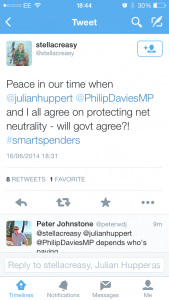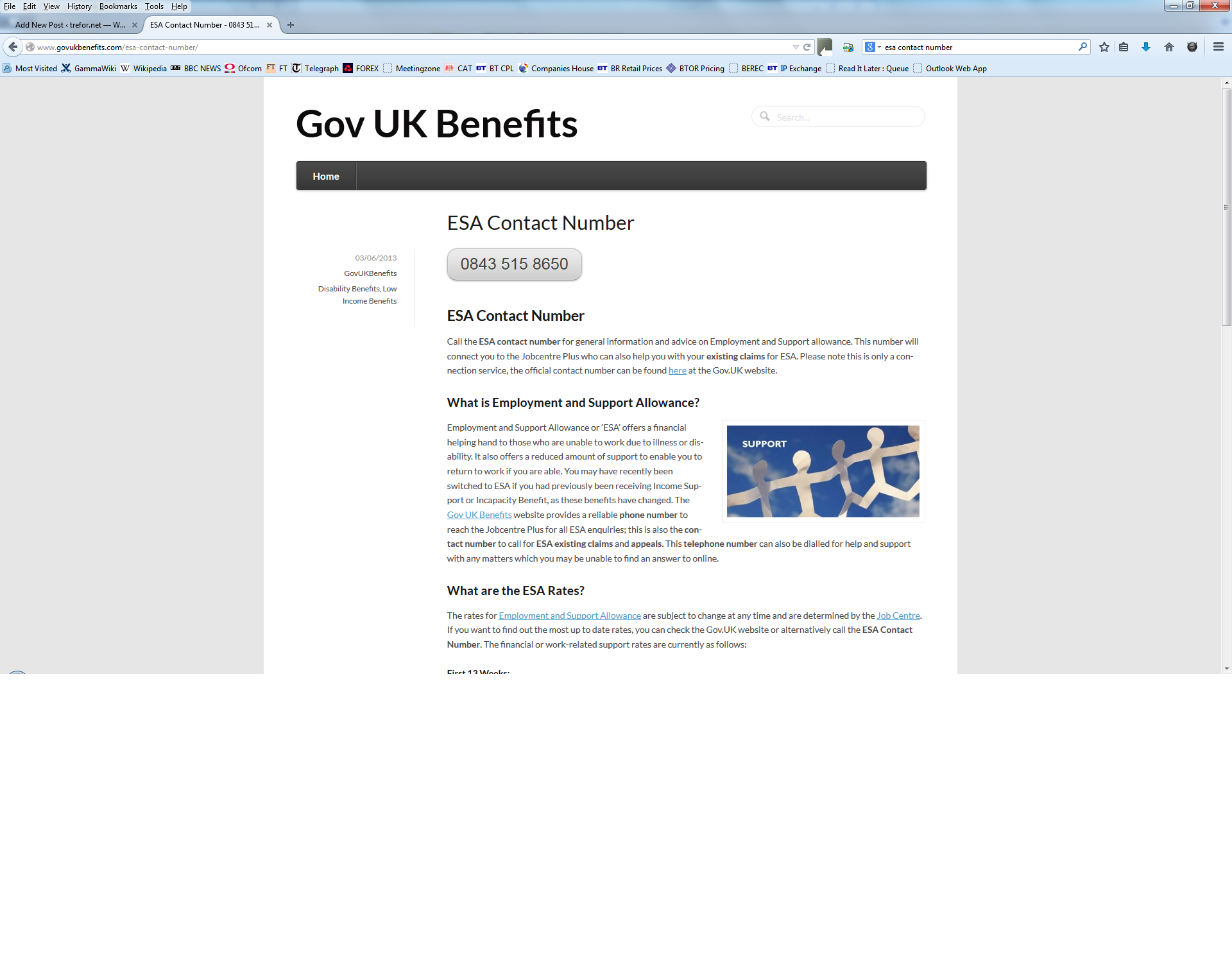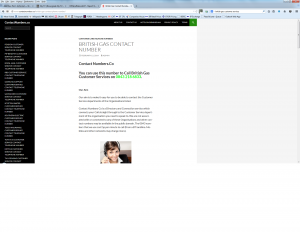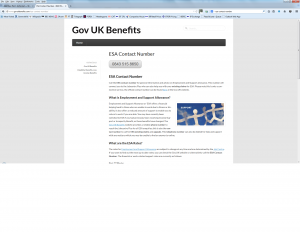ICSS update
A little while ago I was approached by someone else that shares an interest in the subject of Information, Connection and Signposting Services (the so-called ICSS), about which I have previously written on Trefor.Net.
As a brief reminder, someone will buy up all the Google Ad-words (or, I suppose, the Yahoo equivalent if they’re still a thing) for “British Gas Customer Services” and variants thereof, and show a revenue sharing phone number, such as 0844 (which can be upto 7 pence per minute plus your phone company’s access charge) which they then translate to the actual customer service number and pocket the difference.
Since I last wrote about this, the Consumer Rights Directive was transposed and the Financial Conduct Authority implemented a similar requirement to outlaw the use of “premium rate” calls when contacting a company in connection with a contract.
Firstly, some pedantry from me. The term premium rate is bandied about far too often by everyone. It has a very distinct legal meaning, which is based in the Ofcom Premium Rate Services Definition. Broadly, that means it has to be more than 7 pence per minute in terms of the Service Charge element; and as the National Telephone Numbering Plan (given force by virtue of General Condition of Entitlement 17) prohibits the use of anything above 7 pence per minute to just 087x and 09x ranges, then 084 numbers and 03 numbers are not Premium Rate by definition. Hopefully some sub-Editors for the Daily Mail shall take note. Incidentally, the numbering plan doesn’t prevent 087 being used below 7 pence per minute – in the changes to the non-geographic call services market in the summer of 2015, many operators set a service charge of 1-2 pence per minute for 0870 numbers to maintain the status quo. This means they are not “premium rate” despite the fact the next number block in sequence might be 13 pence per minute.
So, now we are all up to speed, why the renewed interest? Well, PhonepayPlus intervened in the ICSS market where the Service Charge element was over 7 pence per minute (i.e. premium rate where they have jurisdiction). They set a prior permission regime, which denoted ICSS has high risk, but then softened this to Special Conditions along with the rest of the prior permission regime in an update to the PhonepayPlus Code of Conduct. Their intervention wasn’t a smooth one, with some ICSS operators seeking a judicial review of their intervention. That will give you an idea of what the market is worth – a view supported by the growing number of entities apparently offering such a “service”. I have a list broken down by year and it has demonstrably been growing over time.
I cannot think of any direct PhonepayPlus censure of an ICSS provider; however, the Advertising Standards Authority has intervened in a couple of cases. The first brought to my attention was in 2014 whereby the ASA ruled against them on the basis it wasn’t clear it was a connection service. Interestingly, in a case in 2015, they went further, discussing that customers looking for a number for customer services wouldn’t go into detailed small print. This is heartening as it means the ASA is almost going further than PhonepayPlus and is a useful alternative body to make complaints to.
Unsurprisingly, the Fair Telecoms Campaign made a suggestion that all ICSS should be treated as Premium Rate Services (i.e. under Phonepayplus control) in their response to the Ofcom consultation on the latest Phonepayplus Code of Conduct. Ofcom dismissed this in their Statement due to a lack of consumer harm being evidenced, which is a stock Ofcom answer for “not important enough to warrant our resource or attention yet”.
That Ofcom position also correlates with me having made representations on behalf of some financial institutions who were rather aggrieved at being passed off (which is still the advice I give people – treat it as impersonation more than a telecommunications regulation issue).
So, it’s clear there’s still a problem, and potentially one that is growing. Where do we go from here?
Well, it is heartening that a Google search I have performed for a few private sector companies people may wish to call (including those I referenced in my original piece) has them in the top couple/three hits with ICSS at least being less obvious and less baiting then I recall, although they are still there. This of course doesn’t get around the natural human instinct of just dialling the number that’s there at the top, of course. However, I cannot say the same for government departments who appear to be subject to it, and, in terms of Ofcom’s statutory duties, should have them pay more attention as it presents services used by the more vulnerable in society.
I believe that the ASA has broader power and is clearly more disposed to using it in situations where ICSS is misleading. The problem here is two-fold though. First, it is a lot harder for a commercial entity to make a complaint to the ASA (something I found out when ITSPA were going to refer EE for its “shed load of data” advert a couple years ago). Secondly, there is a balance between offering a service at a premium taken willingly by lazy consumers (the economists would say “reducing their search costs”); just like being put through to a number given to you by the guys in moustaches at their 118 rates, ICSS can be argued to have a legitimate role in society.
That means we need to have a debate, which is where Ofcom should come in. They are the subject matter experts and have a wide range of powers available for them to research and intervene as they feel appropriate. So, I think my advice needs to be updated as follows;
- Complain to the ASA. It is easier for it to be given attention if the consumer does it as opposed to the passed off company.
- Be in control of your search engine results and outspend the ICSS people if needs be. I haven’t experienced it myself as it isn’t my area, but one ITSPA members tells me Google are receptive to companies complaining they are being passed off, so that should be something done as well.
- Complain to Ofcom. Google “Ofcom contact us” and pray I haven’t been mischievous and bought the ad words for it and translated an 0908 number to their 0300 to fund an Aston Martin. In all seriousness, their details are here.
My experience from dealing with fraud, net neutrality and other issues that various agencies want to try and ignore is that once there’s a clear weight of evidence, in fairness to those agencies, they do start to act. So let’s get the evidence to them and break the vicious cycle of “no action because no reporting” and “no reporting because no action”.




 Philip Davies MP is a libertarian Conservative and as a result is one of my favourite MPs. This means he’s often at polar opposites to Her Majesty’s Opposition and an uncomfortable bed fellow with their coalition partners. That makes it even more incredible that the amendment was gladly supported by both the Shadow Minister, Helen Goodman MP and Julian Huppert MP (Liberal Democrat Member for. Cambridge and a good advocate for the technological community). A rare moment of cross party backbench support that, alas, was defeated without Government support, which is still backing the self regulation horse.
Philip Davies MP is a libertarian Conservative and as a result is one of my favourite MPs. This means he’s often at polar opposites to Her Majesty’s Opposition and an uncomfortable bed fellow with their coalition partners. That makes it even more incredible that the amendment was gladly supported by both the Shadow Minister, Helen Goodman MP and Julian Huppert MP (Liberal Democrat Member for. Cambridge and a good advocate for the technological community). A rare moment of cross party backbench support that, alas, was defeated without Government support, which is still backing the self regulation horse.





